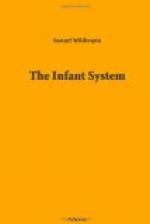Schools for infants then existed, but what were they? Simply dame-schools, with the hornbook for boys and girls, and perhaps a little sewing for the latter. Their sign was—“Children taught to read and work here,” and their furniture the cap and bells, the rod in pickle, and a corner for dunces. The finishing stroke was seen in the parlour of the inn, or the farm-house, in the shape of needlework as a samplar;—“Lydia Languish, her work, done at —— school, in the year of our Lord, 1809.” Such were the schools in country places then in existence, the little ones doing nothing. In after-life, I thought a remedy was required and might be found, and therefore set about working it out. How it was done shall be hereafter explained.
I knew my own infant state had been a happy one, and I wondered to see children crying to go to school, when learning had been such a delight to me. But I soon ceased to wonder when I was sent there myself. At my first school I can truly say I learnt nothing, except it be that I had especially the sense of feeling. I often had raps with the cane on the head, across the shoulders, and on the hand, and I found it was mainly for not learning what the teacher had forgotten to teach me. The terms used were “master” and “mistress,” and they were tolerably appropriate as far as I was concerned, for to me both became objects of terror, so much so, that for the first time in my life, I really fretted when the hour of teaching came. My parents were not long in perceiving this although I did not complain. They told me it was for my good that I should go to school, and I thoroughly believed them. Yet I could not understand why it should be associated with so much dislike and pain on my part, when my first school,—the beautiful world of nature, had been so lovely, and my first teachers had always increased the delight by removing my difficulties, and this so much so that I now longed for evening to come to have fresh light and instruction given. My father now decided that I should not go to school, and he became my teacher as before, the world being my great book. I was delighted with Robinson Crusoe, and this work became my companion, and to which was added the Pilgrim’s Progress. After these, my great favourite was Buffon’s Natural History. I used to go alone, taking a volume at a time, to read amidst the pleasant country around, but most frequently in the quiet nooks and retreats of Hornsey Wood. It seems, however, that I was always watched and superintended by my mother during these readings and rural rambles, for whenever danger was near she generally appeared, but seldom otherwise, so that I had perfect freedom in these matters. I have every reason to believe that the first seven years of my life laid the basis of all I know that is worth knowing, and led to the formation of my character and future career in life. Of my schooling afterwards it is unnecessary to say much, as it was the usual routine such as others had,




